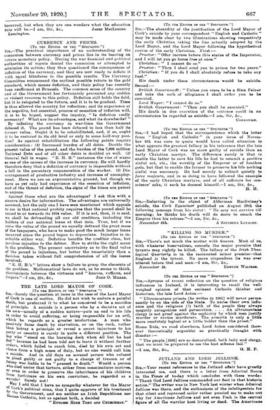THE LATE LORD MAYOR OF CORK.
[To THE EDITOR or rat " Smart:roe.") Six.—Surely the question at issue in the case of the Lord Mayor of Cork is one of motive. He did not wish to endure a painful death, but preferred it to what he conceived to be a sacrifice Of principle. A. suicide is a person who by a decisive act of his own—usually of a sudden nature—puts an end to his life in order to avoid suffering, or being responsible for an evil, which he regards as a greater misfortune. A man who Passively faces death by starvation, or on the rack, rather than betray a principle or reveal a secret injurious to his Party or country is surely in quite a different position. The boy who "stood on the burning deck when all but he had fled" because he had been told not to leave it without further orders, which failed to reach him, died by his own act and choice from a high sense of duty, but no one would call him a suicide. And in old days an acoused person who refused to Plead guilty or not guilty to a charge of treason or of felony. was liable to be "pressed to death." Would a person who died under that torture, either from conscientious motives, ,6r e'en in order to preserve the inheritance of his children trMU forfeiture on his own conviction, be regarded as a sutelde? Surely 'not ..11RY I add that I have no sympathy whatever for the Mayor !if Cork's political aims, that I quite.approve of his treatment the Government, and am neither an Irish Republican nor mass Catholic, but as against both, a decided "Emit= ZAHN Tone AND thnovenatitt."


































 Previous page
Previous page